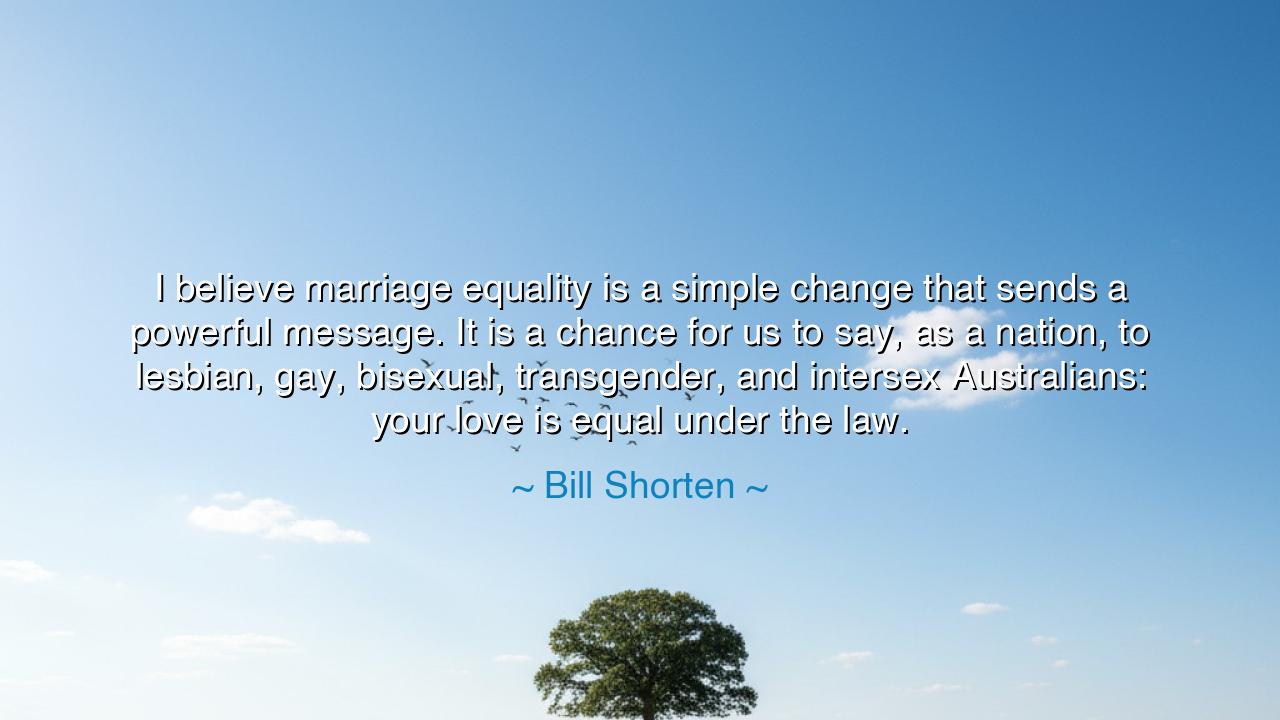
I believe marriage equality is a simple change that sends a
I believe marriage equality is a simple change that sends a powerful message. It is a chance for us to say, as a nation, to lesbian, gay, bisexual, transgender, and intersex Australians: your love is equal under the law.






In the words of Bill Shorten, "I believe marriage equality is a simple change that sends a powerful message. It is a chance for us to say, as a nation, to lesbian, gay, bisexual, transgender, and intersex Australians: your love is equal under the law," we hear the call for a fundamental shift in societal values—a call for equality, acceptance, and justice. Shorten’s words are not just about a legal change, but about a declaration of love, respect, and the affirmation of the rights of every individual to be recognized and treated equally under the law, regardless of their sexual orientation or gender identity. The simplicity of the change he refers to, legal recognition, holds the weight of profound societal transformation, sending a message not only of legal equity but of human dignity and acceptance.
The quest for marriage equality is not new; it is a modern chapter in a long history of struggles for human rights. From the days of ancient societies where love and partnership were bound by rigid norms to the struggles for the abolition of slavery, the fight for equality has always been about breaking down the barriers that divide us as human beings. Just as ancient civilizations struggled with the freedom of the oppressed—whether through racial discrimination or class distinctions—the fight for marriage equality today is rooted in the timeless truth that love knows no bounds and should not be limited by law. To grant marriage equality is to open the doors to true human freedom, where each person can love whom they choose, without fear of discrimination or legal marginalization.
The American Civil Rights Movement is one of the most vivid examples of the power of legal change to send a profound message to society. Leaders like Martin Luther King Jr. championed the cause of equality, advocating for a society where people would be judged not by the color of their skin, but by the content of their character. When the landmark Brown v. Board of Education decision declared that racial segregation in schools was unconstitutional, it sent a powerful message—not just to African Americans, but to the entire nation—that equality could no longer be denied. Similarly, marriage equality represents a legal acknowledgment that love between people of any gender identity or sexual orientation is equal, deserving of the same rights and protections afforded to any other love.
Shorten’s belief that marriage equality is a “simple change” speaks to the truth that equality is often seen as a matter of legal recognition, but its impact reaches far beyond the law itself. By acknowledging marriage equality, society acknowledges that love is universal, a force that transcends all boundaries—cultural, racial, and, yes, sexual. The message is clear: all love deserves respect, all relationships deserve to be recognized, and all people deserve to feel equal. This is not merely about legal formalities; it is about humanity acknowledging the full worth and dignity of all its members.
Moreover, the notion that this change is "simple" highlights how, over time, the barriers to equality that seemed insurmountable become increasingly evident and manageable. The struggles faced by the LGBTQ+ community, though formidable, are facing down the tides of history, much as earlier movements for justice and equality did. Like the efforts to extend voting rights to women or the abolition of racial segregation, the movement for marriage equality is part of a greater, ongoing journey toward a more just and inclusive society. The simplicity of the change is that it does not demand anything more than equal treatment—an easy choice once the prejudices of the past have been confronted and overcome.
In the words of Nelson Mandela, “It always seems impossible until it’s done.” The struggle for marriage equality is a reminder that societal change often begins as a whisper, as a small step, but that small step carries the potential to ripple across history. What was once considered unthinkable becomes the new norm, and what was once a matter of exclusion becomes a matter of justice and respect. Shorten’s call for marriage equality is a call to remove the final barriers that separate people based on arbitrary distinctions, such as sexual orientation or gender identity. It is a declaration that equality is not negotiable, and that no one should be denied the basic human right to love and be loved.
The lesson we take from Shorten’s words is clear: love transcends the boundaries we often place upon it, and the legal recognition of equality is the first step in creating a world where every person is free to love without fear of discrimination. As we move forward, let us take this lesson to heart and work toward a society where all love is celebrated and equal under the law, where every individual is afforded the dignity and respect they deserve, regardless of who they love or how they identify. In our own lives, we must strive to build communities where compassion, acceptance, and understanding reign, and where we actively work to dismantle the barriers that divide us, so that love—all love—can flourish.






AAdministratorAdministrator
Welcome, honored guests. Please leave a comment, we will respond soon